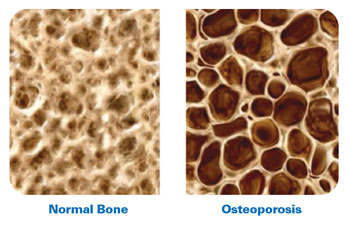Bone Health Clinic is Open!
Providing complete bone health and osteoporosis screening, testing, education and treatment.
 About 54 million Americans have osteoporosis, a common disease of the bones. Studies suggest that approximately 1/2 of women and up to one in four men age 50 and older will break a bone due to osteoporosis.
About 54 million Americans have osteoporosis, a common disease of the bones. Studies suggest that approximately 1/2 of women and up to one in four men age 50 and older will break a bone due to osteoporosis.
Osteoporosis is often called a silent disease because you can’t feel your bones getting weaker. Breaking a bone is often the first sign that you have osteoporosis.
Bone density, or hardness, decreases when you lose too much bone, make too little bone or both. As a result, your bones become weak and may break from a minor fall or injury. Osteoporosis means “porous bone.” If you look at healthy bone under a microscope, you will see that parts of it look like a honeycomb. If you have osteoporosis, the holes and spaces in the honeycomb are much bigger than they are in healthy bone. This means your bones have lost density or mass and that the structure of your bone tissue has become abnormal.
Breaking a bone is a serious complication of osteoporosis, especially when you’re older. Bro-ken bones due to osteoporosis are most likely to occur in the hip, spine and wrist. Twenty per-cent of seniors who break a hip die within one year from problems related to the broken bone itself or the surgery to repair it. About 40% of those who survive need long-term nursing home care.
Osteoporosis is responsible for 2 million broken bones and $19 billion in related costs every year. By 2025, experts predict that osteoporosis will be responsible for approximately 3 million fractures and $25.3 billion in costs each year.
After you reach peak bone mass between the ages of 18 and 25, you may start to slowly lose more bone than you form. In midlife, bone loss usually speeds up in both men and women. For most women, bone loss increases after menopause, when estrogen levels drop sharply. In fact, in the 5-7 years after menopause, women can lose up to 20% or more of their bone density.
Thankfully, treatment exists for low bone density and osteoporosis, but unless you have been evaluated by a Bone Health specialist, you may not even know you need treatment. Medications have been shown to improve bone density and decrease the risk of fractures. Let our bone health specialists at The Orthopaedic Clinic give you the attention you deserve to help you from becoming another victim of this silent, yet serious disease.
